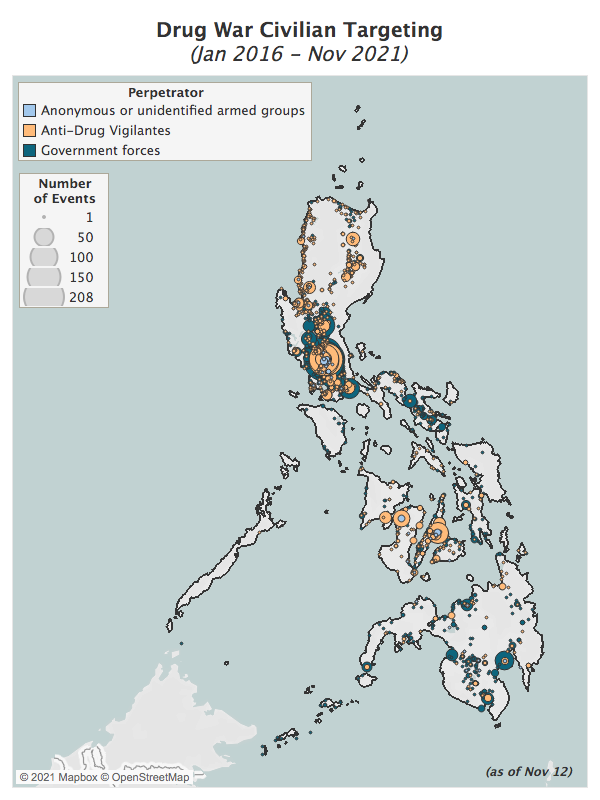18 November 2021: Civilian fatalities from anti-drug operations in the Philippines are at least 25% higher than official figures suggest, new data from the Armed Conflict Location & Event Data Project (ACLED) reveal. ACLED has now expanded coverage of the Philippines through a supplementation project drawing on information from two major Filipino language sources — Abante and the Philippine Star1ACLED already includes information from the Philippine Star in English. — adding nearly 1,000 events and more than 1,100 fatalities to the dataset for the period of 2016 to the present. The supplementation project has specifically bolstered ACLED’s coverage of anti-drug operations, contributing to wider efforts to approximate the drug war’s true toll on civilians in the Philippines. Access the data and read the full report — The Drug War Rages on in the Philippines: New Data on the Civilian Toll, State Responsibility, and Shifting Geographies of Violence.
Key Findings:
ACLED currently estimates that at least 7,742 civilians have been killed in the drug war since 2016.2Data updated as of 12 November 2021. ACLED data are updated weekly and freely available for download.
- This is 25% higher than the government’s September 2021 count of 6,201, even by ACLED’s conservative estimate3ACLED’s civilian fatality estimate includes cases in which civilians deemed to be drug suspects were killed by (1) government forces, such as the police or military; (2) anti-drug vigilantes, assumed to have ties to the state (Amnesty International, 31 January 2017; Human Rights Watch, 5 March 2017; ICC, 14 June 2021); or (3) anonymous or unidentified armed groups, often assumed to be supporters of the government, tacit supporters of the government’s drug policy, or even police themselves as part of “secret death squads” (The Guardian, 3, October 2016). The estimate based on ACLED data is lower than some of the broader estimates noted by other sources because incidents in which drug suspects were armed, based on reports of police injuries, are not included in ACLED’s civilian fatality count; while such victims may meet other definitions of a ‘civilian,’ they are not considered ‘civilians’ per ACLED methodology. ACLED data therefore provide a robust but necessarily conservative estimate of the impact of the drug war on Philippine civilians. This estimate nevertheless includes hundreds more civilian deaths than the government’s official count, amounting to a higher total than other data collection efforts to date.
While anti-drug ‘vigilantes’ were responsible for a large proportion of violence targeting civilians in the early days of the drug war, the majority of civilian targeting in recent years has been carried out directly by state forces.
- At the start of the war in 2016, anti-drug ‘vigilantes’ accounted for over 48% of civilian targeting associated with the drug war
- Now, in 2021, state forces account for 80% of civilian targeting associated with the drug war
The geography of the violence has shifted, particularly from the National Capital Region (i.e. Metro Manila) to Central Luzon.
- While drug war violence in the National Capital Region accounted for nearly 45% of the national total at its peak in late 2016, it now accounts for less than 8% as of the latter half of 2021
- This shift became initially most apparent in 2018 when Central Luzon experienced more drug war violence than the National Capital Region for the first time: 28% of national drug war violence vs. 17%, respectively
- More recently, new frontiers have emerged within Central Luzon, with violence shifting from Bulacan province to Nueva Ecija province
- Nueva Ecija is now home to the most drug war-related violence in the country (nearly 14%), the most drug war-related fatalities in total (nearly 13%), and the most drug war-related civilian fatalities specifically (over 14%) — surpassing both Bulacan and Metro Manila to become the new epicenter of the war
A US-based 501(c)(3) non-profit organization established in 2014, ACLED is the highest quality and most widely used real-time data and analysis source on political violence and protest around the world.
If you would like to use ACLED data and analysis, please review our Terms of Use & Attribution Policy. For more information about ACLED methodology, please check our Philippines Drug War Methodology Brief and our full Resource Library.




